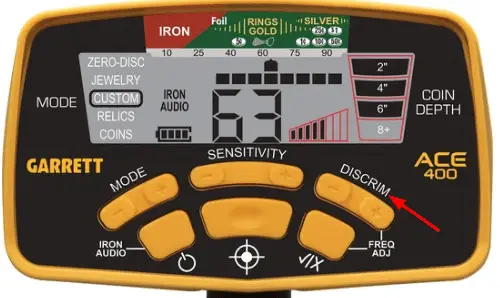If you were tasked with finding metal through concrete, would you think it was possible? Some people
suggest it depends on the metal and others that it depends on the machine. After some serious research,
we got to the bottom of it. Here’s what we found out.
There are many specialized metal detectors on the market that can detect metal through thick
concrete. However, there’s no way to tell what function the detected metal serves. This makes it
challenging to differentiate rebar, plumbing, and even certain wiring from one another.
That said, there’s a lot more to metal detectors than meets the eye. Even with the proper metal detector, you may still have an issue finding metal through concrete and using the machine correctly.
Is it Possible to Detect Metal Through Concrete?
The short answer is yes, it is possible. However, you’ll need a fine-tuned machine with settings for
certain metal types for any practical applications such as tracking, locating, or discovering:
ï‚· Pipes,
ï‚· Rods, and
ï‚· Electrical wiring.
It’s hard to hear, but oftentimes, the flaw with metal detectors is the user. You’ll want to familiarize
yourself with the specific metal detector model you want to ensure you receive the most accurate readings.
Zircon MT6 Professional Grade Handheld Metal Detector

If you’re looking for something to detect metal through concrete then you will want to check out the Zircon MT6. This handheld professional grade metal detector will help you map out metal that’s embedded in any non-metallic construction material. A great tool to add to any construction worker toolbox.
Tips for Detecting Metal Through Concrete
There are many ways to produce a false positive or even misidentify the metal altogether. Here’s a list of
tips for searching for metal in concrete.
ï‚· Double-check the size of the metal. Do this by repeatedly scanning the area. This will help you
identify the metal’s dimensions. It’s not a good practice to dig or drill before you know what
you’re trying to uncover. It can lead to damaged pipes, electrical hazards, and in some cases
zoning violations
 If possible, consult the blueprint. This will save you time as you won’t rediscover pipes and
rebar during your search. If you’re on a sidewalk, take note of how close the sidewalk is to a
home or building. If you continue to get positives it may just be plumbing.
ï‚· Take note of the terrain. Ground mineralization is when specks of natural metals like iron or
copper build up in the soil. This happens due to sedimentation. Ground mineralization can trick the
detector into a false positive due to the amount of natural metals. You can clear the debris to
get a more accurate reading.
 Remember to lower device sensitivity if you’re searching for a large metal item. This ensures
that smaller items like keychains or coins won’t beep when you scan them.
ï‚· Ensure your device is charged. This seems like a no-brainer but a dying battery can result in a
lower-pitched beep than appropriate. This can lead to you drilling or digging for the wrong type
of metal.
What Kind of Metals Are Used in Concrete?

Concrete can be host to a variety of metals used during construction. These are the most common types
typically found in many varieties of concrete:
 Steel: Steel is the most common metal you’ll find in concrete. Especially concrete with large
rebar sections. This is even true with galvanized steel which is often used for pipes and
reinforcing concrete. If you’ve heard that steel is challenging to detect, note that it is not an
impossibility and that this saying typically only applies to stainless steel.
ï‚· Copper: Copper pipes are common in most structures. They are also used in electrical wiring. To
tell the difference between piping and electrical wiring, turn the detector’s sensitivity down and
scan the area. If the beep is localized, then it’s likely wiring.
 Aluminum: Aluminum in concrete is generally coated to prevent severe corrosion. This won’t
affect your ability to detect it, though. Especially if you’re familiar with the emitted beep and
set your detector for aluminum.
 Iron: Iron is generally used in the creation of reinforced steel. It won’t often be found by itself
within building construction. If you find iron pipes, walls, etc., then you can assume the
structure it’s in is notably old. By the 1980s, iron was no longer used as a standalone tool for
construction.
How to Use a Metal Detector on Concrete
Using a metal detector to go through concrete is different from searching for treasure on the beach.
 To use a metal detector on large concrete structures like parking lots or sidewalks, you’ll want
to keep the device elevated about 1ft.
ï‚· Remember to consistently and slowly swing the device to and fro for it to work.
ï‚· Use chalk to mark where the signal is the strongest. This will allow you to make out the size of
the metal. For example, if you’re walking in a straight line and the beeps only occur in front of
you, then chances are you’re walking above pipes or other long metal items.
 However, if you’re using a metal detector specialized in finding metal through concrete for
construction purposes, it will typically be a hand-held VLF device that requires you to press it
where you think the metal might be.
ï‚· Each type of metal gives off a different frequency. Learn the sounds that your metal detector
makes over specific metals. Run the metal detector over iron, steel, silver, and gold to note
the different tones each produces.
Metal Discrimination Feature You Can Use

Advanced metal detectors have a discrimination feature that allows you to skip over minor metal
amounts. Or if you’re specifically looking for a water pipe, you can set the detector to disregard iron.
Iron is rarely if ever, used in water pipes due to the corrosion associated with it. This is just one example
of how to use the discrimination feature.
You’ll also want to set the detection feature on low if looking for large metal items within concrete. This
helps the machine avoid picking up things like:
ï‚· Iron in the soil,
ï‚· Bottlecaps,
ï‚· Staples, etc.
So while you can detect the metal the real challenge is figuring out precisely which metal you’ve found.
What Are the Types of Metal Detectors?
There are 4 types of metal detectors and each one has its own specific purpose. Knowing the differences
is key to finding the right metal detector.
 Industrial: These are the types of metal detectors that pop up at large venues. They’re about
the size of a door frame and are not overly mobile. Industrial metal detectors are expensive and
not generally used for anything other than searches for prohibited items.
ï‚· PI: Metal detectors that use PI or pulse induction are typically going to be for security purposes.
These are the metal detectors that security officers use to do personal checks for illegal items. A
pulse induction metal detector can’t go through thick materials like concrete.
ï‚· BFO: Beat Frequency Oscillators are one of the most common types of metal detectors. The BFO
does have the ability to go through layers of concrete and soil. However, dirt and sand with
natural levels of mineralization can trick the detector.
Additionally, a BFO detector only works through movement. So, to find metal in a specific area you have to continuously move the detector over the area, which means it can’t detect the precise location of the metal. For serious metal hunting, you’ll want a metal detector with more refined settings.
ï‚· VLF: Also known as Very Low Frequency. VLF detectors are designed to find metals through thick
layers like concrete. They also are so finely tuned that ground mineralization won’t affect them.
Furthermore, VLF detectors typically have a setting that will stop them from detecting minor
metals such as aluminum.
[wptb id=786]
Digging Deeper: Different Types of Metal Detectors – Which One is Right For You?
Conclusion – Can You Detect Metal Through Concrete?
What’s the takeaway? Metal detection is a science and requires the user to be familiar with the process
and the machine to be successful. But there are viable options for using a quality metal detector for
detecting metal through concrete.
If you have any questions or comments please leave them in the comments section below. I would love to hear from you!

Dear sir iam Virendra from India.
I have ace 150 metal detector of Garrett.It gave signals on a cemented floor of our d house. Signals were of coins and gold.
We dig the floor 60 cm.,but nothing was there. We found a lid of an earthen pot there and 2 small pieces of earthen pot.
Kindly help and suggest me what to do now
Hello Virendra,
If there are any coins there they might have worked their way deeper into the soil. I would detect in the area without the pots there and see if you still get gold and coin readings. A good pinpointer would help as well. I hope you find what you are looking for.
Thank you so much sir
You are welcome Virendra!